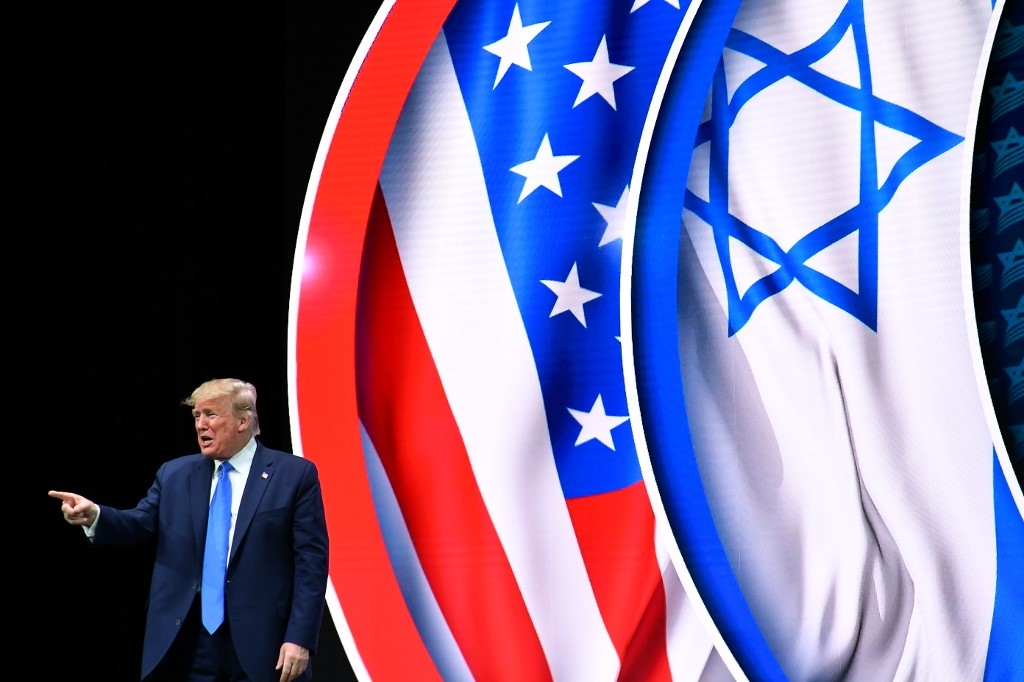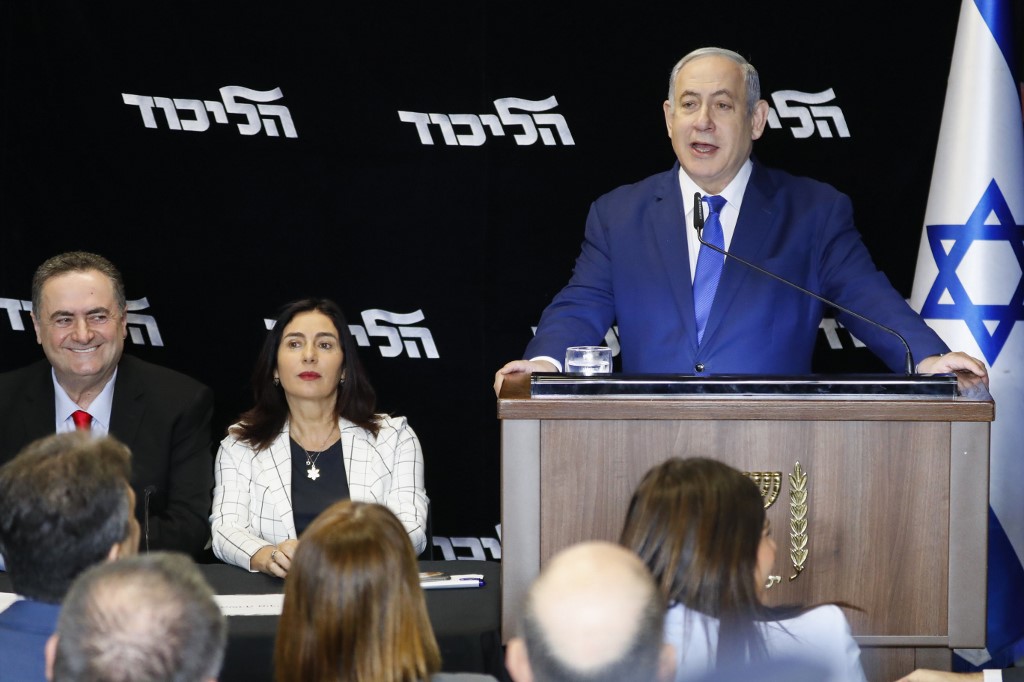The antisemitic deal of the century

Since its inception at the end the 19th century, the Zionist movement has sought to transform the nature of European Jewish identity and the relationship between Jews and the modern movement of antisemitism.
The two movements share the understanding that it is not racism and chauvinism that causes antisemitism; instead, they outrageously claim it is caused by the very presence of Jews in gentile societies - a position that the founder of Zionism, Theodor Herzl, insisted upon in his writings.
Antisemites have been divided since the 1920s between those imperialist Europeans who agreed that Zionism would solve their Jewish “problem” by exporting Jews to Palestine, and the Nazis, who were determined to annihilate Jews altogether.
Antisemitic oppression
Due to the massive opposition of European Jews to Zionism, which remained consistent for half a century until it weakened considerably after the Holocaust, the transformation that Zionism sought was not successful for decades. But starting from the late 1940s, it increased in intensity with every passing decade, until it became hegemonic from the 1970s onwards.
New MEE newsletter: Jerusalem Dispatch
Sign up to get the latest insights and analysis on Israel-Palestine, alongside Turkey Unpacked and other MEE newsletters
While Jewish identity in Western and Eastern Europe before the Zionist transformation was that of a minority population who, as victims of white European Christian antisemitic oppression, fought discrimination and persecution, Zionism insisted that such a fight was not the correct response to antisemitism.
The new definition that Zionism effected can be summarised in two complementary formulae: Jewishness is Zionism is colonialism, and anti-colonialism is anti-Zionism is antisemitism
Instead, it insisted that the only way to end European Christian oppression of Jews was to join European Christians in their colonial ventures outside of Europe, and establish a settler-colony of Jews in Asia at the expense of the native population.
With the defeat of the Nazis, Zionism’s imperialist antisemitic European and US allies supported the establishment of the Zionist settler-colony in 1948.
The Zionist movement affirmed that colonialism, rather than Judaism and Jewishness, would define Jewish identity. It fought against all other Jewish movements that refused its colonial solution, including the Bund, Jewish socialists and communists, Jewish liberal assimilationists, Yiddishists, and not least Orthodox and Reform Judaism, whose major rabbis opposed Zionism vehemently.
Jewishness, the Zionists maintained, should now mean colonising Palestinian land. Rather than fighting against their antisemitic enemies who sought their expulsion from gentile societies, suddenly, Jews were told that antisemites were their allies (as Herzl put it: “The antisemites will become our most dependable friends, the antisemitic countries our allies” and “the governments of all countries scourged by antisemitism will be keenly interested in assisting us to obtain the sovereignty we want”).
Huge propaganda effort
The new definition that Zionism effected can be summarised in two complementary formulae: Jewishness is Zionism is colonialism; and anti-colonialism is anti-Zionism is antisemitism.
A huge propaganda effort was generated to defend Zionist colonialism - and its oppression of Palestinians and theft of their lands - as an intrinsic part of Jewishness and Judaism, and to claim that opposing this alleged intrinsic part of Jewishness and Judaism was nothing short of the “new antisemitism”.
Conversely, supporting Zionist and Israeli theft of Palestinian lands and the oppression of Palestinians became the highest form of philosemitism, as exemplified by the tireless expressions of support for Israel and its policies by current US and European leaders.
European imperialist antisemites fully supported this understanding of Jewishness, and adopted it as their way of transforming their antisemitism into philosemitism. The list extends from the major antisemitic British politicians who supported Zionist efforts from the turn of the 20th century - Joseph Chamberlain, Arthur Balfour and Winston Churchill - to US President Donald Trump.
That Jews, Judaism and Jewishness had had a radically different understanding of themselves for two millennia in Europe - one that did not include colonising another people’s land and oppressing them - seems immaterial to the Zionist and antisemitic rewriting of Jewish history and identity.
Israel’s weaponisation of the charge of antisemitism against anti-colonialism became the order of the day from the early 1970s onwards.
During that decade, after Israel’s land conquests of 1967, Zionism achieved its greatest success in convincing Jewish and gentile supporters of the new colonial identity it had engineered for Jews - even if the majority of the world’s Jewish populations consistently refused to become colonists in Israel.
Attacking BDS
In the last few years, with the rise of substantial and considerable support for Palestinians among Jews and gentiles worldwide - especially through the boycott, divestment and sanctions (BDS) movement - Israel and its Western allies have sought to fight the rising tide by making the antisemitic and Zionist definition of Jewishness formal and legally binding.
The new definition, which equates Jews with Zionists and colonists, was propagated by the International Holocaust Remembrance Alliance (IHRA). The group adopted a working definition of antisemitism in 2016, which included “manifestations … targeting of the state of Israel, conceived as a Jewish collectivity”.
During the last year, we have witnessed a major advance in this antisemitic consensus, which seeks to erase Jewish identities that do not accord with Zionism. The EU adopted the IHRA definition last December, as have France and Germany; more recently, UK Prime Minister Boris Johnson and Trump have moved to criminalise support for BDS, especially at universities.
The situation is complicated by the more recent rise of white supremacist antisemitism, which targets Jews in the US and Europe, but simultaneously allies itself with Zionism and Israel (this is the case in Austria, Poland, Ukraine, Hungary, Germany and the US).
Israel’s current strategy is to conflate white supremacist antisemitism with anti-Zionism and anti-colonialism, insisting that those who hate Jews on racial and religious grounds and those who oppose Zionist colonialism and racism are one and the same.
Indeed, it is hardly coincidental that the antisemitic supporters of Israel in the US and Europe are also the major Islamophobes of the day. The same European antisemitic forces who hated Jews before Zionism - and love them after Zionism - are the same forces that hate Muslims (depicted in their majority as anti-Zionists) today.
The charge of antisemitism against Muslims has indeed become a main feature, if not a justification, of Islamophobia across Europe and the US.
Liquidating the Palestinian struggle
Trump’s understanding that Jews love money, and that the country of American Jews is Israel and Benjamin Netanyahu is “your prime minister”, is the basis of his so-called “deal of the century” to liquidate the Palestinian anti-colonial struggle and impose the antisemitic definition that implicates all Jews in Zionist colonialism.
That he appointed three American Zionist Jewish officials, who have no legitimacy whatsoever to represent American Jews, to oversee the deal - including his son-in-law, Jared Kushner; his envoy, Jason Greenblatt; and his ambassador to Israel, David Friedman - is designed to convince Jews and gentiles that all Jews now accept and support the antisemitic and Zionist equation of Jews with Zionism with colonialism, and that any opposition to this equation will from now on be legally considered antisemitic.
The recent legal measures across Europe and the US to implicate all Jews in Israeli crimes are the clearest evidence of this failure
The “deal of the century” is essentially a deal to impose this antisemitic definition on the world as the essence of philosemitism, suggesting that any defence of the Palestinian people and their rights is the essence of antisemitism.
The tide that opposes Zionist and Israeli racism and colonialism today, however, has become too great to be contained by these repressive and antisemitic policies.
That so many Jews and gentiles today across the world, especially within the BDS movement and movements such as Jewish Voice for Peace, insist that Jews should not be defined as Zionists, let alone as colonists, has effectively challenged the new antisemitic consensus of implicating all Jews in Israel’s colonial policies.
The recent legal measures across Europe and the US to implicate all Jews in Israeli crimes are the clearest evidence of this failure.
The views expressed in this article belong to the author and do not necessarily reflect the editorial policy of Middle East Eye.
Middle East Eye delivers independent and unrivalled coverage and analysis of the Middle East, North Africa and beyond. To learn more about republishing this content and the associated fees, please fill out this form. More about MEE can be found here.







